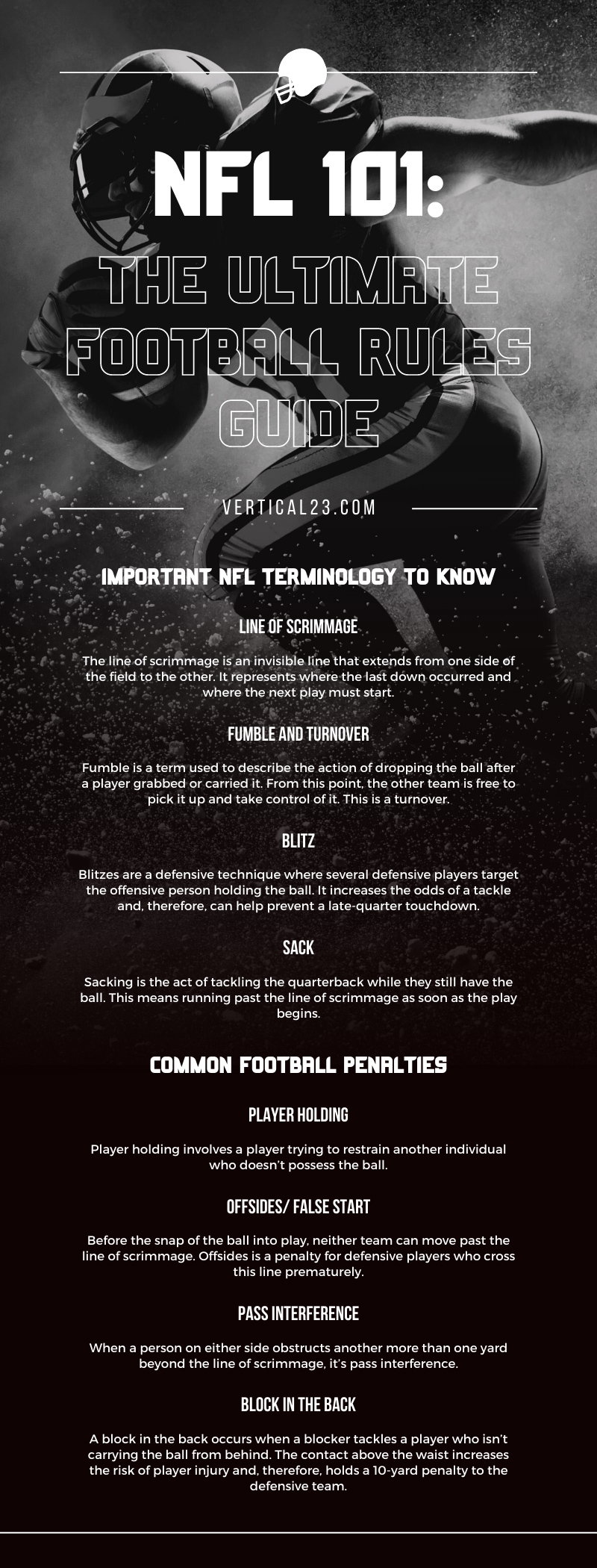When determining the most popular sport in the United States, it doesn’t take a nationwide poll to get your answer: American football. Coast to coast, this sport reigns supreme, capturing the attention of millions every single season. As such, it’s no surprise that a regular influx of newcomers wants a taste of the action. But the game is not as simple as passing a ball and scoring touchdowns. Football can be complex for those without prior knowledge, and you must have a fundamental understanding of the core rules if you’re going to keep up. In this ultimate football rules guide, we’ll provide a crash course in NFL 101 and ensure you know everything you need come game day.
The Basics of NFL Football for Beginners
As you can surmise, the objective of football, like most other sports, is to score. One team pits themselves against the other in a clash of wills and bodies to score the most points during play. However, football varies in several ways from other types of sports, and you should know exactly how and why that is. Here are some basics to remember as you watch your first game.
Team Structure
For starters, each team is held to a strict structure regarding how many people are on the field at once. Professional football teams have 11 players on the field simultaneously, each given a position and role to perform during the game. The offensive team’s positions, responsible for scoring, are the quarterback, running backs, tight end, wide receivers, and offensive line. While the defensive team’s positions, those trying to prevent the other team from scoring, are linebackers, defensive backs, and defensive line. Special team positions such as kicker or punter interact with the ball during kick-offs, punts, and field goals.
Logistics and Timing
Football games consist of an hour of playtime, with multiple stops and starts to account for new plays, penalties, and judgment calls. So, while each game will be four 15-minute quarters, the game may take longer if the score is tied and overtime begins. Playtime is any second where the ball is in motion. The quarterly timer will stop at the end of every play or down.
It’s also important that you know about the scoring system. Touchdowns, scores that happen upon getting the ball to the end zone at the end of the field, are six points followed by a potential additional point for a field goal. The offensive team can also attempt a field goal for three points if they’re close enough to the end zone.
Playing the Game
At the start of every game, one team becomes the offensive side for the first quarter. During this time, the objective of this team is to move the ball from the center of the 100-yard field to their opponent’s end. Each play they make must progress the ball at least 10 yards to start the next play with an advantage. Otherwise, their next down will begin from the same center line. A down involves the player with the ball getting obstructed by the defending team’s players, triggering a brief reset before starting another play.
Once the quarter ends, the offensive team brings in their defensive players while the defensive team moves into offense. The pattern repeats, for the remaining two quarters, with both teams scoring as much as possible during their time as offense. Then, when the final quarter ends, the game either concludes or goes into overtime. Keep in mind, though, that overtime only occurs if both teams have the same number of points.
Important NFL Terminology To Know
In addition to knowing the game’s basic rules, there’s also a series of terms you should commit to memory if you want to keep up with the action. These are some of the top phrases you’ll hear.
Line of Scrimmage
The line of scrimmage is an invisible line that extends from one side of the field to the other. It represents where the last down occurred and where the next play must start.
Fumble and Turnover
Fumble is a term used to describe the action of dropping the ball after a player grabbed or carried it. From this point, the other team is free to pick it up and take control of it. This is a turnover.
Blitz
Blitzes are a defensive technique where several defensive players target the offensive person holding the ball. It increases the odds of a tackle and, therefore, can help prevent a late-quarter touchdown.
Sack
Sacking is the act of tackling the quarterback while they still have the ball. This means running past the line of scrimmage as soon as the play begins.
Scramble
The quarterback doesn’t always have to throw the ball. Instead, they may decide to scramble with the ball past the defensive line to avoid being sacked.
Common Football Penalties
If you want to impress your family members with your football know-how, you’ll want to make sure you know a few penalties. After all, every NFL game has a few speed bumps along the way, and this ultimate football rules guide will help you keep everything straight.
Player Holding
Player holding involves a player trying to restrain another individual who doesn’t possess the ball. This action is illegal in the game as it lowers fairness between teams and increases the risk of injury.
Offsides/ False Start
Before the snap of the ball into play, neither team can move past the line of scrimmage. Offsides is a penalty for defensive players who cross this line prematurely. In comparison, false starts are the same for the offensive side.
Pass Interference
To keep things fair, every player must have the ability to catch the ball. So, when a person on either side obstructs another more than one yard beyond the line of scrimmage, it’s pass interference.
Block in the Back
A block in the back occurs when a blocker tackles a player who isn’t carrying the ball from behind. The contact above the waist increases the risk of player injury and, therefore, holds a 10-yard penalty to the defensive team.
Whether you’re looking to learn more about football or keep up with some of your favorite teams, Vertical23 has the information you need. Our experts constantly research the NFL’s teams, rule sets, and past game statistics to give you an edge when choosing a team to root for. Our top NFL picks for upcoming games are free. So, don’t miss out!



